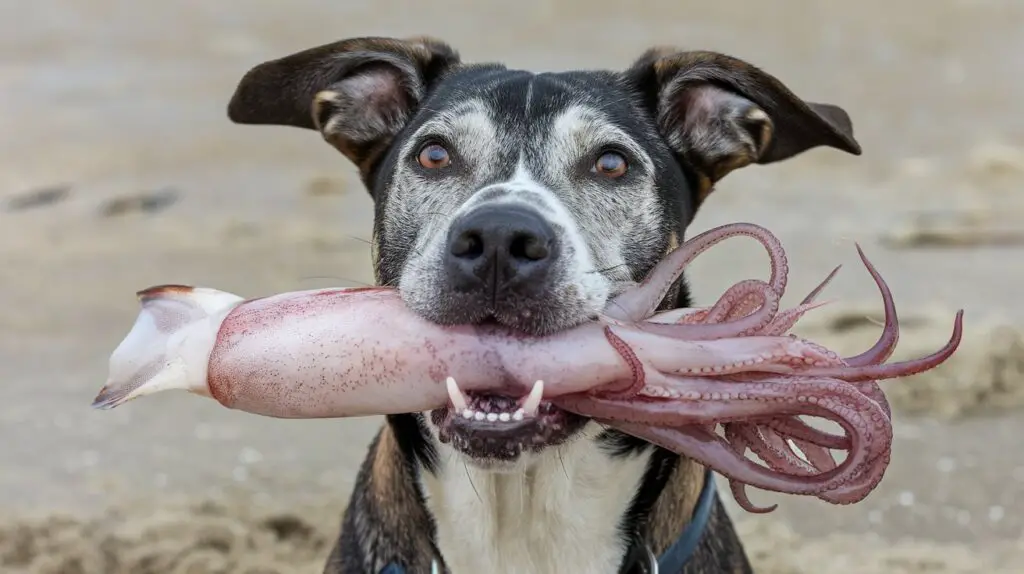Introduction
If you’re considering a new snack for your dog, you might wonder, Can dogs eat squid? The answer is yes—cooked squid can be an occasional treat, offering beneficial nutrients that support your dog’s health. However, it’s essential to understand both the benefits and potential risks before adding it to their diet. In this article, you’ll learn whether squid is good or bad for dogs and the best ways to serve it safely.
Can Dogs Eat Squid?
Yes, dogs can eat plain, fully cooked squid in moderation. Avoid raw or seasoned squid, as it may be harmful.
- Introduction
- What Are Squid?
- Can Dogs Eat Squid?
- Is Squid Good for Dogs?
- Is Squid Bad for Dogs?
- Benefits of Squid for Dogs
- Risks of Squid for Dogs
- Alternative of Squid for Dogs
- A Table of Nutrition’s Squid
- Can Dogs Eat Squid Ink?
- Can Dogs Eat Squid Jerky?
- Can Dogs Eat Raw Squid?
- Can Dogs Eat Dried Plantains?
- Can Dogs Eat Squid Balls?
- Can Dogs Eat Canned Squid?
- How to Safely Feed Squid to My Dogs?
- What Should I Do If My Dog Eats Squid?
What Are Squid?
Squids are cephalopods belonging to the mollusk family, known for their two long tentacles and eight arms. As ocean predators, they move by swimming backward, using their arms to propel water behind them. Like octopuses, squids have soft bodies and use their long tentacles to catch prey while their arms assist in movement. They also can change color for camouflage, helping them evade predators.
Ingredients of Squid
Ingredients found in squids include nutritional components like protein, fat, carbohydrates, vitamins like vitamin B12, B6, E, and K, folate, pantothenic acid, and niacin, minerals like selenium, iron, zinc, copper, calcium, magnesium, manganese, phosphorus, and potassium.

Can Dogs Eat Squid?
Yes, dogs can eat cooked squid occasionally, as it provides beneficial nutrients for their health. However, feeding too much can cause digestive issues. Raw squid should always be avoided, as it may contain harmful bacteria that can make dogs sick. Always serve squid fully cooked and in moderation.
Is Squid Good for Dogs?
Squids are good for dogs because they contain nutrients like protein sources which require a protein-rich diet. Squids are low in fat but rich in omega-3 fatty acids. Squids also provide a good source of vitamins and minerals. Squids can support skin and coat health. They can also help to reduce inflammation.
Is Squid Bad for Dogs?
Eating too much squid can be harmful to dogs, potentially causing vomiting, diarrhea, or choking. While rare, excessive consumption can also lead to mercury poisoning, which may result in high blood pressure, abdominal pain, and emotional instability. If your dog has allergies or health issues, it’s best to consult a veterinarian before introducing squid into their diet.

Benefits of Squid for Dogs
There are few benefits of squids for dogs are:
- Great source of protein: Proteins in squid helps to improve muscle growth as they exercise. If you want to give your dog a low-fat, and protein-rich meal add a small amount of squid to homemade dog food.
- Rich in beneficial fatty acids: Squids have omega-3 fatty acids that help to avoid inflammation and reduce joint pain in arthritic dogs. Fatty acids can also lower the level of cholesterol that can cause heart diseases. Fatty acids can improve brain function.
- Full with nutrients: Squids have a good source of essential vitamins and minerals. Vitamins like vitamin C, E, B12, riboflavin, and other antioxidants can reduce the risk of cell damage in a dog’s body. They can also reduce the risk of infection from pathogens and viruses. Squids also contain high levels of minerals like potassium, phosphorus, magnesium, calcium, and manganese, etc.
Risks of Squid for Dogs
There are few risks of squids for dogs are:
- Allergic reactions: Dogs have health issues and allergic reactions from some foods. When you give your dog a new food check that your dog has any health issue or allergic reaction from this food, firstly consult with your veterinarian. If the veterinarian says yes then give your dog that food.
- Mercury poisoning: Squids contain minerals like copper that helps to improve the formation of red blood cells in dogs. They also contain high levels of mercury, selenium, and other harmful minerals. High levels of mercury contain symptoms like abdominal pain, emotional instability, and reduced blood pressure.
- Illness: Uncooked squid contains harmful bacteria that are not good for dogs and cause severe health issues. So, always give your dog cooked, steam, boil, or bake squid that is without the spices.
Alternative of Squid for Dogs
The alternatives of squids for dogs are:
- Shrimp: Shrimp are rich in proteins. They also have omega-3 fatty acids, and vitamins. Shrimp is low in fat and calories. They are good for dogs with sensitivities.
- Cod: Cod have good sources of protein that are good for dogs. They are rich in omega-3 fatty acids, and vitamin B12. Cod supports skin and coat health.
- Salmon: Salmon are rich in protein, omega-3 fatty acids, and vitamins. They support joint mobility and heart health. Salmon also helps to reduce inflammation.
- Sardines: Sardines are small, oily fish that are rich in omega-3 fatty acids. They help to support skin coat and heart health. They also provide a good source of calcium.
A Table of Nutrition’s Squid
| Nutrients | Value | % Daily Value |
| Calories | 78 | 4% |
| Protein | 18g | 36% |
| Fat | 3g | 5% |
| Saturated fat | 0.5g | 3% |
| Cholesterol | 300mg | 100% |
| Sodium | 200mg | 8% |
| Potassium | 400mg | 12% |
| Fiber | 0g | 0% |
| Sugar | 0g | 0% |
| Vitamins | Value | % Daily Value |
| Vitamin B12 | 18.3mcg | 765% |
| Vitamin B6 | 0.5mg | 25% |
| Vitamin E | 1.5mg | 10% |
| Vitamin K | 0.4mcg | 5% |
| Folate | 17.5mcg | 4% |
| Niacin | 2.5mg | 13% |
| Pantothenic acid | 1.3mg | 13% |
| Minerals | Value | % Daily Value |
| Selenium | 44.8mcg | 64% |
| Zinc | 1.4mg | 9% |
| Iron | 0.5mg | 3% |
| Copper | 0.5mg | 25% |
| Phosphorus | 264mg | 26% |
| Magnesium | 39mg | 10% |
| Manganese | 0.3mg | 15% |
| Calcium | 33mg | 3% |
Pros
Cons
Can Dogs Eat Squid Ink?
Yes, dogs can eat squid ink. Dogs can eat squid ink in small amounts, excessive amounts can cause health issues that make dogs sick.
Can Dogs Eat Squid Jerky?
Yes, dogs can eat squid jerky. It is full of nutrients and has high-quality proteins. It also contains omega-3 fatty acids that are good for dogs. Before feeding squid jerky to your dogs, you will have to make sure that they are safe for dogs. Consult with your veterinarian for medical considerations.
Can Dogs Eat Raw Squid?
Raw squid is not good for dogs. Raw squid contains harmful bacteria that makes your dog sick. It can also cause stomach upset like vomiting, diarrhoea, and other health issues. So, it is better to avoid feeding raw squid to your dogs.

Can Dogs Eat Dried Plantains?
Yes, dogs can eat dried plantains but in small amounts. Cooked or dried plantains are good for dogs. They contain fiber, excessive amounts of fiber can cause issues like digestive upset. So, feed your dog dried plantains in small amounts.
Can Dogs Eat Squid Balls?
Yes, dogs can eat squid balls. They are tasty and nutritious treats for dogs. Squid balls have high-quality proteins, vitamins, and minerals. But they also cause health issues like choking hazard, allergic reactions, etc.
Can Dogs Eat Canned Squid?
Yes, dogs can eat canned squid because it can provide a lot of health benefits. It is high in sodium and has rich minerals like mercury, which can cause mercury poisoning. So, it’s best to feed canned squid in small amounts.
How to Safely Feed Squid to My Dogs?
Squids are good for dogs because they are rich in protein, have omega-3 fatty acids, and nutrients. If you want to give squid to your dogs then cook thoroughly. You will also bake, boil, or roast the squid. Squids are given in small amounts, excessive amounts can cause health problems.
What Should I Do If My Dog Eats Squid?
Squids are rich in protein. They also have minerals like mercury that are not good for dogs and cause issues like poisoning, vomiting, and diarrhoea. Eating squid in small amounts from time to time does not affect the dog’s health. Excessive amounts can cause severe health issues and make dogs sick. So, firstly consult with your veterinarian.
Squids are rich in proteins, have omega-3 fatty acids, vitamins, minerals, and a lot of beneficial nutrients that are good for dogs. They can also have health issues for dogs if eaten in excessive amounts. So, before giving new food to your dog consult with your veterinarian for medical issues.





